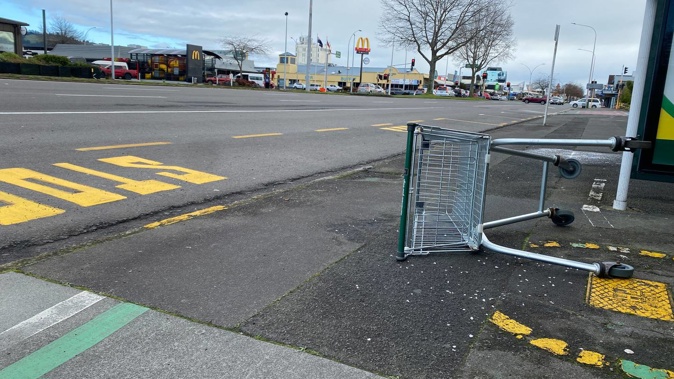
Today, the Rotorua Daily Post launches a series called Fighting for Rotorua that looks into the city’s housing crisis, the motel misery and what is being done to make it better. Kelly Makiha reports.
Nearly $70 million has been spent on emergency housing in Rotorua over almost five years and the average stay in motels has stretched to 35 weeks, new figures reveal.
A slide presentation by the Rotorua Lakes Council, obtained by the Rotorua Daily Post Weekend, also reveals Government officials were warned about the city's dire situation in February last year.
The presentation described Rotorua as being on a "downward spiralling poverty crisis exacerbated by siloed Government initiatives".
The number of people staying in emergency housing in Rotorua has dropped in the past month and Social Development Minister Carmel Sepuloni said she wanted to see an end to longer-term emergency housing within five years.
Despite this, figures given to the Rotorua Daily Post Weekend show the Government has spent $69,712,492 on emergency housing and special needs grants in Rotorua from June 1, 2017 to September 30, 2022.
The figures remain high despite a public outcry for more than two years since the homeless were housed in motels when New Zealand was plunged into lockdown in March 2020.
In the three months to the end of June 2022 alone, just over $5 million was spent on putting homeless people into Rotorua motels. The figures for the months of July to September were yet to be released.
National Party housing spokesman Chris Bishop asked for a range of data from the Government during Parliamentary question time.
It showed the average number of consecutive weeks spent in Rotorua emergency housing at the quarter ending June 2022 was 35 - more than eight months - up from 18 weeks two years prior.
That is three and a half months longer than the national average during the same period, which was 21 weeks.
The average stay in Rotorua for people with children at the quarter ending June 2022 was 31 compared with 17 in June 2020.
For both sets of data, the time spent in emergency housing has risen sharply in the past quarter.
So far, 57 families have spent longer than a year in emergency housing in Rotorua.
/cloudfront-ap-southeast-2.images.arcpublishing.com/nzme/M3GBJA3EBRGA4T36PEERFRH3K4.jpg)
The data shows the median length of time to house someone on the Housing Register at A20 (the ranking for those most in need) was nearly two years (619 days) as of June 2022.
A confidential slide presentation revealed in documents obtained by the Rotorua Daily Post Weekend under the Official Information Act was titled "Rotorua in crisis" and covered a number of issues from emergency housing to a lack of new homes being built.
It said children were being placed in "dangerous and unsuitable" accommodation by the Government and "Rotorua was in a downward spiralling poverty crisis exacerbated by siloed Government initiatives".
It said at the time of the report there had only been a net increase of 42 social houses in three years and only another 23 were in the pipeline - yet hundreds of new builds were needed "now".
The presentation said Rotorua's population had risen 13 per cent yet housing stock had only increased 3 per cent.
Bishop told the Rotorua Daily Post Weekend emergency housing was a social and economic disaster for Rotorua and he accused the Government of putting it in the "too-hard basket".
/cloudfront-ap-southeast-2.images.arcpublishing.com/nzme/WCUAHFOERZBANBPTLMXXOHRFBA.jpg)
National's housing spokesman Chris Bishop. Photo / Mark Mitchell
He said Labour had made things worse, despite campaigning to fix the housing crisis.
"The stories I've heard on the ground from people in Rotorua are just heart-wrenching. The town and its people deserve so much better. Millions of dollars are being spent, but things are getting worse, not better."
Sepuloni said the Government was working hard to address Rotorua's housing issues.
She said Rotorua's housing market was under pressure because of an increase in the population of more than 9000 people since mid-2013, with only 1600 new homes consented.
The Ministry of Housing and Urban Development had worked closely with the Rotorua Lakes Council to increase housing supply and they were having some success, she said.
"But it will take time to build the houses required to make up the shortfall. We are also working very hard to end the need for emergency housing."
She said the number of people in emergency housing in New Zealand was falling but there was a way to go.
/cloudfront-ap-southeast-2.images.arcpublishing.com/nzme/SUVPSVAKYUAKBD4SRLDQ7SL424.jpg)
In Rotorua, there had been "significant improvements" to the processes and supports around accessing emergency accommodation.
Case managers from the Ministry of Social Development were now sharing an office with support services at the community housing hub, Te Pokapū, who were assessing and "triaging" all new people looking for emergency housing support in Rotorua.
"Services and case managers in Rotorua work in a holistic integrated way with wellbeing, employment, training and support all factored into the assessment and ongoing support."
She said preventing people from needing emergency housing was the first priority.
/cloudfront-ap-southeast-2.images.arcpublishing.com/nzme/FSIF3X3VJZT24IAZBOXGR2JCZE.jpg)
Social Development Minister Carmel Sepuloni. Photo Mark Mitchell
"Our goal is to end the need for longer-term emergency housing within five years, with emergency housing provision becoming something that is very short term, and only when there is an emergency need."
Figures given to the Rotorua Daily Post Weekend by the Ministry of Social Development this week show 231 households were in emergency housing in Rotorua at the end of last month.
This was down from 256 at the end of August and down from a high of 370 at the end of December 2021.
Rotorua mayor Tania Tapsell said it was disappointing that nearly $70 million had been spent on a solution that had a much wider impact on the Rotorua community.
"There is a need for some form of emergency housing for our own locals but I've urged Government to confirm an end to out-of-town homeless continuing to be placed here."
She said it was unsafe to house people in motels and the buildings had resource consent for tourism accommodation only.
/cloudfront-ap-southeast-2.images.arcpublishing.com/nzme/GV7SFUIGHAUKBORXCAE7AEWEU4.jpg)
Rotorua mayor Tania Tapsell. Photo / Andrew Warner
"A motel is not a home and people deserve a better standard of living so building homes is the long-term solution. [The] council is working hard to support the delivery of more housing options and development, and to fast-track and enable more social housing where we can."
She said there needed to be an end to the emergency housing practice in Rotorua and she said her discussions with Housing Minister Megan Woods about this had been positive.
She said Rotorua needed government support for its tourism industry because of the significant reputational damage it had suffered.
Fighting for Rotorua is part of a major NZME editorial project, The New New Zealand: Rebuilding Better, which will examine how we can rebuild economically and socially as we emerge from Covid and create a fairer and more prosperous New Zealand.
Take your Radio, Podcasts and Music with you









